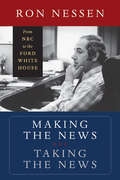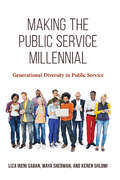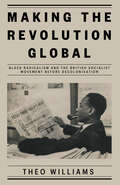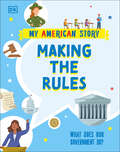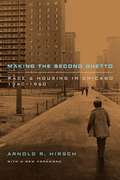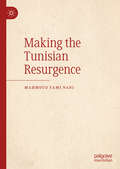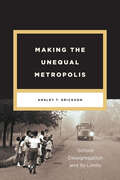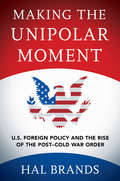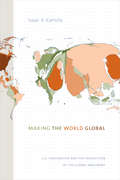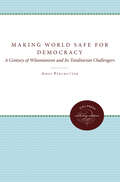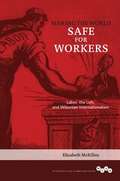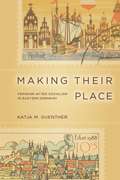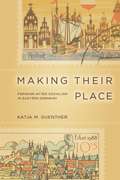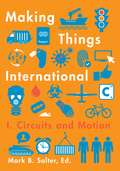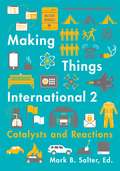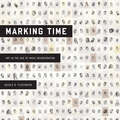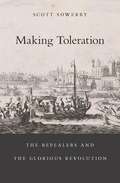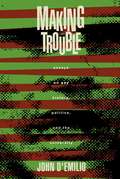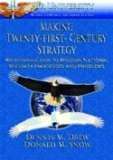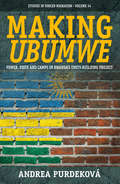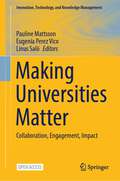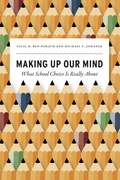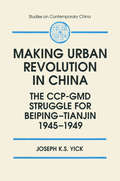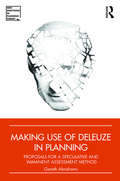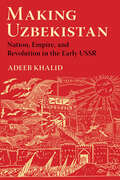- Table View
- List View
Making the News, Taking the News: From NBC to the Ford White House
by Ron NessenFor fifteen years, Ron Nessen enjoyed an extraordinary career covering the major national events of the 1960s and '70s for NBC News, and later serving as White House press secretary to President Gerald R. Ford. Making the News, Taking the News remembers the events and personalities that dominated national politics during Nessen's career, bringing a hard-won perspective to those tumultuous times. Through an interweaving of countless incidents and personal anecdotes, Nessen builds a story that captures the true grit of closed-door politics. Off-the-record briefings and strategy sessions, as well as descriptions of experiences with Vietnam troops in the field, provide a vivid illustration of the life of an on-the-road reporter. At the heart of the book is Nessen's White House years, as the veteran reporter gives a valuable eyewitness account of events both behind the scenes and in front of the cameras that shaped and altered America during two critical decades.
Making the Public Service Millennial: Generational Diversity in Public Service
by Maya Sherman Liza Ireni Saban Keren ShlomiMaking the Public Service Millennial explores how a new generation of public service employees affects the dynamics of continuity and change in public management and ethics. The book begins with the premise that Generation Y poses new challenges for public management, which will lead to changes in work-related values, rules, structures, and behaviors in the public service system. Will the soon-future leaders of today's public organizations pose new challenges for public management? How will this cohort cope with ethically-questionable behaviors? Given these questions, the potential strategic value of an empirical, cohort-based approach to ethical decision-making in the public service suggests interesting managerial implications for the effective incorporation of ethics into the management of public organizations. With implications for many types of organizations, and particularly for public sector organizations in democratic societies, managers across organizations should view generational differences not merely as a demographic variable, but as manifestations of broader social trends that may undermine established public management practices and organizational climates.
Making the Revolution Global: Black Radicalism and the British Socialist Movement before Decolonisation
by Theo WilliamsHow black radicals reshaped the British leftMaking the Revolution Global shows how black radicals transformed socialist politics in Britain in the years before decolonisation. African and Caribbean activist-intellectuals, such as Amy Ashwood Garvey, C.L.R. James, Jomo Kenyatta, Kwame Nkrumah and George Padmore, came to Britain during the 1930s and 1940s and intervened in debates about capitalism, imperialism, fascism and war. They consistently argued that any path towards international socialism must have colonial liberation at its heart. Although their ideas were met with opposition from many on the British Left, they convinced significant sections of the movement of the revolutionary potential of colonised peoples. By centring the entanglements between black radicals and the wider British socialist movement, Theo Williams casts new light on responses to the 1935 Italian invasion of Ethiopia, the 1945 Fifth Pan-African Congress, and a wealth of other events and phenomena. In doing so, he showcases a revolutionary tradition that, as illustrated by the global Black Lives Matter demonstrations of 2020, is still relevant today.
Making the Rules: What does our Government do? (My American Story)
by DKInspires young learners to explore America&’s government institutions through the nation&’s history and the experience of modern AmericansPart of an inspiring series of books that supports students in understanding government and civics in the United States, Making the Rules interweaves historical context, events, and personalities with the experiences of modern Americans to help students understand key social studies topics, including the origins of American institutions and values and their relevance to young people&’s lives today.The book explores government&’s impact on daily life, including raising money through taxation, security, protecting citizens&’ rights, organization, and providing services. The author also explains the role of other authorities such as state government. Historical topics and events include examples of different roles of government: security during wartime, providing services, and supporting people in need of help.
Making the Second Ghetto: Race and Housing in Chicago, 1940-1960
by Arnold R. HirschIn Making the Second Ghetto, Arnold Hirsch argues that in the post-depression years Chicago was a "pioneer in developing concepts and devices" for housing segregation. Hirsch shows that the legal framework for the national urban renewal effort was forged in the heat generated by the racial struggles waged on Chicago's South Side. His chronicle of the strategies used by ethnic, political, and business interests in reaction to the great migration of southern blacks in the 1940s describes how the violent reaction of an emergent "white" population combined with public policy to segregate the city. "In this excellent, intricate, and meticulously researched study, Hirsch exposes the social engineering of the post-war ghetto. "—Roma Barnes, Journal of American Studies "According to Arnold Hirsch, Chicago's postwar housing projects were a colossal exercise in moral deception. . . . [An] excellent study of public policy gone astray. "—Ron Grossman, Chicago Tribune "An informative and provocative account of critical aspects of the process in [Chicago]. . . . A good and useful book. "—Zane Miller, Reviews in American History "A valuable and important book. "—Allan Spear, Journal of American History
Making the Tunisian Resurgence
by Mahmoud Sami NabiThis book investigates the socioeconomic factors that triggered Tunisia’s "revolution for dignity” and the current issues and challenges facing its economy while suggesting mechanisms and instruments for their resolution. The author begins by analyzing the roots of the revolution and the post-revolution situation from a political sociology perspective and then diagnoses the Tunisian economy before and after the revolution and identifies the multidimensional binding constraints preventing it from escaping the middle-income trap. The book then explores the pillars of an inclusive development strategy that Tunisia should pursue. The emphasis is made on building inclusive institutions, developing a new social contract and reinventing the country's leadership. Beyond the institutional dimension, the author suggests innovative financial channels, discusses the strategy of a successful integration of the Tunisian economy in the global economy as well as the pillars of its transformation into a knowledge-based economy.
Making the Unequal Metropolis: School Desegregation and Its Limits (Historical Studies of Urban America)
by Ansley T. EricksonIn a radically unequal United States, schools are often key sites in which injustice grows. Ansley T. Erickson's Making the Unequal Metropolis presents a broad, detailed, and damning argument about the inextricable interrelatedness of school policies and the persistence of metropolitan-scale inequality. While many accounts of education in urban and metropolitan contexts describe schools as the victims of forces beyond their control, Erickson shows the many ways that schools have been intertwined with these forces and have in fact--via land-use decisions, curricula, and other tools--helped sustain inequality. Taking Nashville as her focus, Erickson uncovers the hidden policy choices that have until now been missing from popular and legal narratives of inequality. In her account, inequality emerges not only from individual racism and white communities' resistance to desegregation, but as the result of long-standing linkages between schooling, property markets, labor markets, and the pursuit of economic growth. By making visible the full scope of the forces invested in and reinforcing inequality, Erickson reveals the complex history of, and broad culpability for, ongoing struggles in our schools.
Making the Unipolar Moment: U.S. Foreign Policy and the Rise of the Post-Cold War Order
by Hal BrandsIn the late 1970s, the United States often seemed to be a superpower in decline. Battered by crises and setbacks around the globe, its post–World War II international leadership appeared to be draining steadily away. Yet just over a decade later, by the early 1990s, America's global primacy had been reasserted in dramatic fashion. The Cold War had ended with Washington and its allies triumphant; democracy and free markets were spreading like never before. The United States was now enjoying its "unipolar moment"—an era in which Washington faced no near-term rivals for global power and influence, and one in which the defining feature of international politics was American dominance. How did this remarkable turnaround occur, and what role did U.S. foreign policy play in causing it? In this important book, Hal Brands uses recently declassified archival materials to tell the story of American resurgence.Brands weaves together the key threads of global change and U.S. policy from the late 1970s through the early 1990s, examining the Cold War struggle with Moscow, the rise of a more integrated and globalized world economy, the rapid advance of human rights and democracy, and the emergence of new global challenges like Islamic extremism and international terrorism. Brands reveals how deep structural changes in the international system interacted with strategies pursued by Jimmy Carter, Ronald Reagan, and George H. W. Bush to usher in an era of reinvigorated and in many ways unprecedented American primacy. Making the Unipolar Moment provides an indispensable account of how the post–Cold War order that we still inhabit came to be.
Making the World Global: U.S. Universities and the Production of the Global Imaginary
by Isaac A. KamolaFollowing World War II the American government and philanthropic foundations fundamentally remade American universities into sites for producing knowledge about the world as a collection of distinct nation-states. As neoliberal reforms took hold in the 1980s, visions of the world made popular within area studies and international studies found themselves challenged by ideas and educational policies that originated in business schools and international financial institutions. Academics within these institutions reimagined the world instead as a single global market and higher education as a commodity to be bought and sold. By the 1990s, American universities embraced this language of globalization, and globalization eventually became the organizing logic of higher education. In Making the World Global Isaac A. Kamola examines how the relationships among universities, the American state, philanthropic organizations, and international financial institutions created the conditions that made it possible to imagine the world as global. Examining the Center for International Studies, Harvard Business School, the World Bank, the Social Science Research Council, and NYU, Kamola demonstrates that how we imagine the world is always symptomatic of the material relations within which knowledge is produced.
Making the World Safe for Democracy: A Century of Wilsonianism and Its Totalitarian Challengers
by Amos PerlmutterIn this interpretive study, Amos Perlmutter offers a comparative analysis of the twentieth century's three most significant world orders: Wilsonianism, Soviet Communism, and Nazism. Anchored in three hegemonical states--the United States, the Soviet Union, and Nazi Germany--these systems, he argues, shared certain characteristics that distinguished them from other attempts to restructure the international political scene. While Communism and Nazism were committed to imperial ideologies, Wilsonianism was inspired by an exceptionalist, peaceful, democratic, and free market world order. But all three were able to mobilize industrial, technological, and military resources in pursuing their goals. In the process of examining the democratic, Communist, and Nazi systems, Perlmutter also provides a framework for understanding U.S. foreign policy over the course of the century, particularly during the Cold War. He underscores the importance of ideology in establishing an international order, arguing that in the wake of the Soviet Union's demise, no system--not even Wilsonianism--can lay claim to the title of new world order.Originally published in 1997.A UNC Press Enduring Edition -- UNC Press Enduring Editions use the latest in digital technology to make available again books from our distinguished backlist that were previously out of print. These editions are published unaltered from the original, and are presented in affordable paperback formats, bringing readers both historical and cultural value.
Making the World Safe for Workers: Labor, the Left, and Wilsonian Internationalism (The Working Class in American History)
by Elizabeth McKillenIn this intellectually ambitious study, Elizabeth McKillen explores the significance of Wilsonian internationalism for workers and the influence of American labor in both shaping and undermining the foreign policies and war mobilization efforts of Woodrow Wilson's administration. McKillen highlights the major fault lines and conflicts that emerged within labor circles as Wilson pursued his agenda in the context of Mexican and European revolutions, World War I, and the Versailles Peace Conference. As McKillen shows, the choice to collaborate with or resist U.S. foreign policy remained an important one for labor throughout the twentieth century. In fact, it continues to resonate today in debates over the global economy, wars in Iraq and Afghanistan, and the impact of U.S. policies on workers at home and abroad.
Making Their Place: Feminism After Socialism in Eastern Germany
by Katja GuentherThe collapse of state socialism in eastern and central Europe in 1989 had a dramatic impact on women. Witnessing the loss of state support for their economic activity, the curtailing of their reproductive rights, and the rise of gender ideologies that value women primarily as mothers and wives rather than as active participants in the workforce, women across eastern and central Europe organized on a local level to resist these changes. Making Their Place brings to light how feminist movements in two eastern German cities, Erfurt and Rostock, utilized local understandings of politics and gender to enhance their possibilities for meaningful social change. The book chronicles the specific reasons why place matters, the importance of localized experiences during the socialist era, and how history shapes contemporary identities, cultures, and politics. What emerges is the fascinating story of the different ways people have struggled to define themselves, their values, and their understandings of gender in a period of monumental social, economic, and political upheaval.
Making Their Place: Feminism After Socialism in Eastern Germany
by Katja M. Guenther<div><p class="first">The collapse of state socialism in eastern and central Europe in 1989 had a dramatic impact on women. Witnessing the loss of state support for their economic activity, the curtailing of their reproductive rights, and the rise of gender ideologies that value women primarily as mothers and wives rather than as active participants in the workforce, women across eastern and central Europe organized on a local level to resist these changes. <br></p><p><i>Making Their Place</i> brings to light how feminist movements in two eastern German cities, Erfurt and Rostock, utilized local understandings of politics and gender to enhance their possibilities for meaningful social change. The book chronicles the specific reasons why place matters, the importance of localized experiences during the socialist era, and how history shapes contemporary identities, cultures, and politics. What emerges is the fascinating story of the different ways people have struggled to define themselves, their values, and their understandings of gender in a period of monumental social, economic, and political upheaval.</p></div>
Making Things International 1
by Mark B. SalterBuilding on recent debates in critical social theory and international relations, Making Things International I: Circuits and Motion presents twenty-five essays that engage the global, the local, and the international through the lens of objects. It represents the first substantial new materialist intervention in global politics and international relations, offering a diverse and provocative set of reflections on how different objects create, sustain, complicate, and trouble the international. Problematizing the stuff of global life, Making Things International focuses on contemporary materialist scholarship on the international realm. The first of two volumes, these original contributions by both new and established scholars examine how war, diplomacy, trade, communication, and mobile populations are made by things: weapons, vehicles, shipping containers, commodities, passports, and more. The authors demonstrate how mundane, everyday objects--not normally understood as international--are in fact deeply implicated in how we think of the world: blood, garbage, viruses, traffic lights, clocks, memes, and ships' ballast. Contributors: Michele Acuto, U College London; Peter Adey, Royal Holloway U of London; Rune Saugmann Andersen, U of Helsinki; Jessica Auchter, U of Tennessee at Chattanooga; Mike Bourne, Queen's U Belfast; Kathleen P. J. Brennan; Elizabeth Cobbett, U of East Anglia; Stefanie Fishel, Hobart and William Smith Colleges; Emily Gilbert, U of Toronto; Jairus Grove, U of Hawai'i at Manoa; Charlie Hailey, U of Florida; John Law, Open U; Wen-yuan Lin, National Tsing-hua U; Oded Löwenheim, Hebrew U of Jerusalem; Chris Methmann; Benjamin J. Muller, U of Western Ontario; Can E. Mutlu, Bilkent U; Geneviève Piché; Joseph Pugliese, Macquarie U; Katherine Reese; Michael J. Shapiro, U of Hawai'i at Manoa; Benjamin Stephan; Daniel Vanderlip; William Walters, Carleton U; Melissa Autumn White, U of British Columbia; Lauren Wilcox, U of Cambridge; Yvgeny Yanovsky.
Making Things International 2: Catalysts and Reactions
by Mark B. SalterDrawing widely from contemporary social and critical thought, Making Things International 2 offers provocative interventions into debates about causality, connection, and politics through the notion of assemblage. Political assemblages, especially those that cross national borders, can be catalyzed by a host of surprising sparks. Present-day global systems are complex and interdependent, but the worn tools of traditional international relations theory are unsuited to the task of understanding how objects, ideas, and people come together to create, dispute, solve, or perhaps cause these political configurations. Contributors to this volume bring to their work a new sensitivity toward issues of power, authority, control, and sovereignty.The companion volume, Making Things International 1: Circuits and Motion, used things, stuff, and objects in motion to capture the material dynamics of global politics and to demonstrate the importance of the material. This volume builds on that conversation by examining objects that incite political assemblages. Specific subjects include fighter jets, smartphones, tents, HTTP cookies, representations of North Korea, and histories of the diplomatic cable, the orange prison jumpsuit, and container shipping.Contributors: Rune Saugmann Andersen, U of Helsinki; Josef Teboho Ansorge; Claudia Aradau, King's College London; Helen Arfvidsson; Alexander D. Barder, Florida International U; Tarak Barkawi, London School of Economics; Peter Chambers; Shine Choi, Seoul National U; Sagi Cohen; Thomas N. Cooke; Anna Feigenbaum, Bournemouth U; Andreas Folkers, Goethe-U Frankfurt; Fabian Frenzel, U of Leicester; Kyle Grayson, Newcastle U; Nicky Gregson, Durham U; David Grondin, U of Ottawa; Xavier Guillaume, U of Edinburgh; Emily Lindsay Jackson, Acadia U; Miguel de Larrinaga, U of Ottawa; Debbie Lisle, Queen's U Belfast; Mary Manjikian, Regent U; Nadine Marquardt, Goethe-U Frankfurt; Patrick McCurdy, U of Ottawa; Adam Sandor; Nisha Shah, U of Ottawa; Julian Stenmanns, Goethe-U Frankfurt; Casper Sylvest, U of Southern Denmark; Rens van Munster, Danish Institute for International Studies; Elspeth Van Veeren, U of Bristol; Srdjan Vucetic, U of Ottawa; Juha A. Vuori, U of Turku; Tobias Wille.
Making Time: Art in the Age of Mass Incarceration`
by Nicole R. Fleetwood"A powerful document of the inner lives and creative visions of men and women rendered invisible by America’s prison system. More than two million people are currently behind bars in the United States. Incarceration not only separates the imprisoned from their families and communities; it also exposes them to shocking levels of deprivation and abuse and subjects them to the arbitrary cruelties of the criminal justice system. Yet, as Nicole Fleetwood reveals, America’s prisons are filled with art. Despite the isolation and degradation they experience, the incarcerated are driven to assert their humanity in the face of a system that dehumanizes them. Based on interviews with currently and formerly incarcerated artists, prison visits, and the author’s own family experiences with the penal system, Marking Time shows how the imprisoned turn ordinary objects into elaborate works of art. Working with meager supplies and in the harshest conditions—including solitary confinement—these artists find ways to resist the brutality and depravity that prisons engender. The impact of their art, Fleetwood observes, can be felt far beyond prison walls. Their bold works, many of which are being published for the first time in this volume, have opened new possibilities in American art. As the movement to transform the country’s criminal justice system grows, art provides the imprisoned with a political voice. Their works testify to the economic and racial injustices that underpin American punishment and offer a new vision of freedom for the twenty-first century."
Making Toleration: The Repealers and the Glorious Revolution
by Scott SowerbyIn the reign of James II, minority groups from across the religious spectrum, led by the Quaker William Penn, rallied together under the Catholic King James in an effort to bring religious toleration to England. Known as repealers, these reformers aimed to convince Parliament to repeal laws that penalized worshippers who failed to conform to the doctrines of the Church of England. Although the movement was destroyed by the Glorious Revolution, it profoundly influenced the post-revolutionary settlement, helping to develop the ideals of tolerance that would define the European Enlightenment. Based on a rich array of newly discovered archival sources, Scott Sowerby’s groundbreaking history rescues the repealers from undeserved obscurity, telling the forgotten story of men and women who stood up for their beliefs at a formative moment in British history. By restoring the repealer movement to its rightful prominence, Making Toleration also overturns traditional interpretations of King James II’s reign and the origins of the Glorious Revolution. Though often depicted as a despot who sought to impose his own Catholic faith on a Protestant people, James is revealed as a man ahead of his time, a king who pressed for religious toleration at the expense of his throne. The Glorious Revolution, Sowerby finds, was not primarily a crisis provoked by political repression. It was, in fact, a conservative counter-revolution against the movement for enlightened reform that James himself encouraged and sustained.
Making Trouble: Essays on Gay History, Politics, and the University
by John D'EmilioFirst Published in 1992. Routledge is an imprint of Taylor & Francis, an informa company.
Making Twenty-First-Century Strategy: An Introduction to Modern National Security Processes and Problems
by Dennis M. Drew Donald M. SnowMaking Twenty-first-century Strategy: An Introduction to Modern National Security Processes and Problems
Making Ubumwe: Power, State and Camps in Rwanda's Unity-Building Project (Forced Migration #34)
by Andrea PurdekováSince the end of the Rwandan genocide, the new political elite has been challenged with building a unified nation. Reaching beyond the better-studied topics of post-conflict justice and memory, the book investigates the project of civic education, the upsurge of state-led neo-traditional institutions and activities, and the use of camps and retreats shape the "ideal" Rwandan citizen. Rwanda's ingando camps offer unique insights into the uses of dislocation and liminality in an attempt to anchor identities and desired political roles, to practically orient and symbolically place individuals in the new Rwandan order, and, ultimately, to create additional platforms for the reproduction of political power itself.
Making Universities Matter: Collaboration, Engagement, Impact (Innovation, Technology, and Knowledge Management)
by Pauline Mattsson Eugenia Perez Vico Linus SalöIn an era of rapid change and increasing societal demands, the role of universities as knowledge producers and catalysts for change has come under scrutiny. This open access book offers a fresh perspective on the significance of universities in society, shedding light on how their knowledge can truly matter beyond academia. Drawing upon insightful inquiries from both the Swedish and international contexts, this volume delves into the multifaceted interactions between universities and various knowledge users, emphasizing the need for scholars to reflect on how their knowledge can become useful and applicable to wider society. Organized into three compelling themes, collaboration, engagement, and impact, this book explores the concept of "mattering". Together and jointly, they point at the fluid movement of scholars and scholarly knowledge across academic, political, and public spaces, and the intentional actions of scientists to leverage their expertise for real-world impact. Essential reading for social science and humanities scholars, university management professionals, and individuals keen on a critical understanding of the evolving role of universities, this volume offers a comprehensive examination of how universities have mattered, continue to matter, and can shape the future.
Making Up Our Mind: What School Choice Is Really About (History and Philosophy of Education Series)
by Sigal R. Ben-Porath Michael C. JohanekIf free market advocates had total control over education policy, would the shared public system of education collapse? Would school choice revitalize schooling with its innovative force? With proliferating charters and voucher schemes, would the United States finally make a dramatic break with its past and expand parental choice? Those are not only the wrong questions—they’re the wrong premises, argue philosopher Sigal R. Ben-Porath and historian Michael C. Johanek in Making Up Our Mind. Market-driven school choices aren’t new. They predate the republic, and for generations parents have chosen to educate their children through an evolving mix of publicly supported, private, charitable, and entrepreneurial enterprises. The question is not whether to have school choice. It is how we will regulate who has which choices in our mixed market for schooling—and what we, as a nation, hope to accomplish with that mix of choices. Looking beyond the simplistic divide between those who oppose government intervention and those who support public education, the authors make the case for a structured landscape of choice in schooling, one that protects the interests of children and of society, while also identifying key shared values on which a broadly acceptable policy could rest.
Making Urban Revolution in China: The CCP-GMD Struggle for Beiping-Tianjin, 1945-49 (Studies On Contemporary China)
by Joseph K.S. YickThe end of the Sino-Japanese War in 1945 brought not peace but renewed confrontation between Mao Zedong's Chinese Communist Party and Chiang Kaishek's Guomindang. The ensuing Civil War, at the threshold of the Cold War, held enormous significance for international strategic alliances, and in particular the interests of the United States in East Asia, and has been the subject of intense research and debate ever since. Joseph Yick's Making Urban Revolution in China: The CCP-GMD Struggle for Beiping-Tianjin, 1945-1949, based partly on the rich new sources available in the PRC since 1978, rethinks the traditional interpretations of the Chinese Communist Party's victory in 1949 and makes a major contribution to the historiography of this period.
Making Use of Deleuze in Planning: Proposals for a speculative and immanent assessment method (New Directions in Planning Theory)
by Gareth AbrahamsMaking Use of Deleuze in Planning translates and re-creates some of Gilles Deleuze’s most abstract philosophical concepts to form a new, practicable planning assessment tool. It shows what his philosophy can do for planning theory as well as planning assessment practice and, in doing so, sets out a pragmatic approach to Deleuzian studies: one that helps form bridges between ontological problems and the problems found in professional practice. It also breaks new ground in assessment methodology by challenging the essentialist ideas underpinning assessment methods like BREEAM and setting out and testing a new form of non-essentialist assessment named SIAM. The book argues that Deleuze’s philosophy can be made useful to planning as long as one is prepared to adapt and re-create his key ontological concepts to respond to the specific demands of the field.
Making Uzbekistan: Nation, Empire, and Revolution in the Early USSR
by Adeeb KhalidIn Making Uzbekistan, Adeeb Khalid chronicles the tumultuous history of Central Asia in the age of the Russian revolution. He explores the complex interaction between Uzbek intellectuals, local Bolsheviks, and Moscow to sketch out the flux of the situation in early-Soviet Central Asia. His focus on the Uzbek intelligentsia allows him to recast our understanding of Soviet nationalities policies. Uzbekistan, he argues, was not a creation of Soviet policies, but a project of the Muslim intelligentsia that emerged in the Soviet context through the interstices of the complex politics of the period. Making Uzbekistan introduces key texts from this period and argues that what the decade witnessed was nothing short of a cultural revolution.
